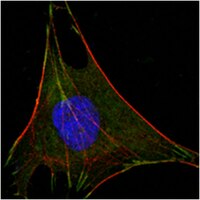MABN691 Sigma-AldrichAnti-GPI Antibody, clone 1B7D7
Anti-GPI Antibody, clone 1B7D7 is a highly specific mouse monoclonal antibody, that targets Glucose-6-phosphate isomerase & has been tested in western blotting, IHC & Immunofluorescence.
More>> Anti-GPI Antibody, clone 1B7D7 is a highly specific mouse monoclonal antibody, that targets Glucose-6-phosphate isomerase & has been tested in western blotting, IHC & Immunofluorescence. Less<<Produits recommandés
Aperçu
| Replacement Information |
|---|
Tableau de caractéristiques principal
| Species Reactivity | Key Applications | Host | Format | Antibody Type |
|---|---|---|---|---|
| H, R | WB, IHC, IF | M | Ascites | Monoclonal Antibody |
| References |
|---|
| Product Information | |
|---|---|
| Format | Ascites |
| Control |
|
| Presentation | Mouse monoclonal IgG1 ascitic fluid containing up to 0.1% sodium azide. |
| Quality Level | MQ100 |
| Physicochemical Information |
|---|
| Dimensions |
|---|
| Materials Information |
|---|
| Toxicological Information |
|---|
| Safety Information according to GHS |
|---|
| Safety Information |
|---|
| Packaging Information | |
|---|---|
| Material Size | 100 µL |
| Transport Information |
|---|
| Supplemental Information |
|---|
| Specifications |
|---|
| Global Trade Item Number | |
|---|---|
| Référence | GTIN |
| MABN691 | 04053252917431 |
Documentation
Anti-GPI Antibody, clone 1B7D7 FDS
| Titre |
|---|
Anti-GPI Antibody, clone 1B7D7 Certificats d'analyse
| Titre | Numéro de lot |
|---|---|
| Anti-GPI, clone 1B7D7 - VP1401290 | VP1401290 |
| Anti-GPI, clone 1B7D7 - QVP1305168 | QVP1305168 |
| Anti-GPI, clone 1B7D7 -VP1510021 | VP1510021 |
| Anti-GPI, clone 1B7D7 -VP1605046 | VP1605046 |
| Anti-GPI, clone 1B7D7 -VP1608178 | VP1608178 |
| Anti-GPI, clone 1B7D7 Monoclonal Antibody | VP1703315 |









